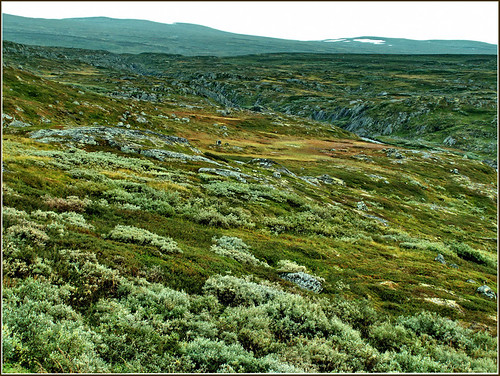Arctic Tundra is Being Lost As Far North Quickly Warms
Posted by Big Gav in arctic, global warming
Yale Environment 360 has an article on the impact of global warming on the arctic - Arctic Tundra is Being Lost As Far North Quickly Warms.
During the summer of 2007, lightning strikes sparked five tundra fires on Alaska’s North Slope. Two of the fires — rare events north of the Arctic Circle — began in neighboring drainages, only a couple of days apart. That, in itself, might have gained the attention of tundra researchers. But the 2007 fire season would ultimately burn a record swath across the North Slope, while reshaping the way scientists think about the Arctic’s response to global warming.
Researchers have known for years that the Arctic landscape is being transformed by rising temperatures. Now, scientists are amassing growing evidence that major events precipitated by warming — such as fires and the collapse of slopes caused by melting permafrost — are leading to the loss of tundra in the Arctic. The cold, dry, and treeless ecosystem — characterized by an extremely short growing season; underlying layers of frozen soil, or permafrost; and grasses, sedges, mosses, lichens, and berry plants — will eventually be replaced by shrub lands and even boreal forest, scientists forecast.
Much of the Arctic has experienced temperature increases of 3 to 5 degrees F in the past half-century and could see temperatures soar 10 degrees F above pre-industrial levels by 2100. University of Vermont professor Breck Bowden, a watershed specialist participating in a long-term study of the Alaskan tundra, said that such rapidly rising temperatures will mean that the “tundra as we imagine it today will largely be gone throughout the Arctic. It may take longer than 50 or even 100 years, but the inevitable direction is toward boreal forest or something like it.”
With temperatures increasing across the Arctic, the Alaskan tundra as we know it could be gone before the end of the century, some scientists predict.
Dominique Bachelet, a climate change scientist at Oregon State University, forecasts that by 2100 tundra “will largely disappear from the Alaskan landscape, along with the related plants, animals, and even human ecosystems that are based upon it.” She made that prediction in 2004, and now says “the basic premise still holds, but the mechanism of change may be different than we thought.” Instead of long-term, incrementally complex changes caused by gradually warming temperatures, “extreme events will be the important triggers for change.” Hot-burning fires or slumping hillsides tied to melting permafrost could “clean the slate and allow new species to establish themselves,” Bachelet said.






